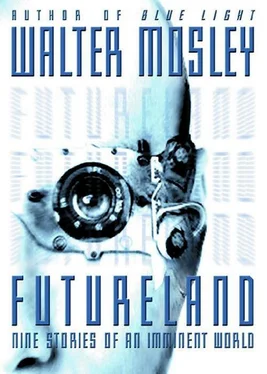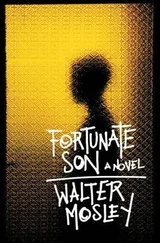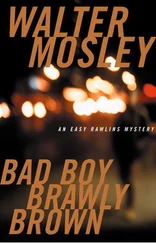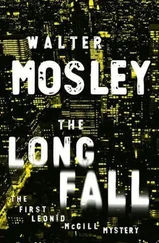“The Court has reached a decision,” The Court said. “You are not qualified.”
“I still wish to represent my own case,” Frendon said.
“You are not qualified,” The Court repeated. Frendon thought he detected a slight arrogance in the tone of his judge and jury. The latent personality of a dozen dying judges superimposed on an almost infinite array of prismatic memory.
“I would be if you allowed it.”
The wait this time was even longer. Officer Brill left the room to communicate with the Outer Guard. The Outer Guard was the warden of the Sacramento jail, which was annexed to the Sac’m Justice System. Most trials lasted between ten and twenty minutes since the automated system had been installed — politicians claimed that justice had become an objective reality for the first time in the history of courts.
“Objective,” Fayez Akwande had said at the Sixth Radical Congress’s annual address, “for the poor. The rich can still hire a flesh and blood lawyer, and a breathing attorney will ask for a living judge; a court appointed robot defender will never do such a thing.”
Every once in a while one of the Prime Judging Units got stuck in a justice loop. This would have to run its course. The unit itself was programmed to interrupt after a certain number of repetitions. Officer Brill went to report that the rest of the prisoners slated to appear before Prime Nine should be distributed among the other eleven judges. This hardly mattered because of the speed of the system. There was never any backlog in Sacramento. Every other court system in the country was waiting to install its own automatic justice system.
One hundred thirty-seven minutes and fifteen seconds later Prime Nine came to life.
“There is not enough information on which to base our decision,” P-nine said. “How would you present your case?”
“As any man standing before a court of his peers,” Frendon said. “I will state my circumstances and allow the jury to measure their worth.”
We must see if the system is sophisticated enough to value the political nature of the law, Tristan the First, Dominar of the Blue Zone, had said to Frendon as he sat in the pews of South Boston Infochurch eighteen months before on a cold February day. These mechanical systems may be a threat to the basic freedom of corporations and that is not in the best interest of the state.
Frendon didn’t care about politics or Infochurch or even Dr. Kismet, the closest thing to God on Earth. Congress and the House of Corporate Advisors were just so many fools in his opinion — but fools who had their uses.
“There are no special circumstances,” P-nine said after a brief delay. “The witnesses and physical evidence and your own confession along with your psychological profile leave a less than oh point oh oh seven three one possibility of circumstances that would alter your sentence.”
“But not no possibility,” Frendon said, still following the Dominar’s script.
“It is left up to the discretion of the court to decide what is probable in hearing a plaintiff’s argument.”
“You mean that if AttPrime Five decided that an argument had such a low chance to work it could decide not to present it?” Frendon asked.
A red light came on at the upper left corner of Prime Nine’s gray casing. A bell somewhere chimed.
The door behind Frendon came open. He could hear Otis Brill’s squeaky rubber soles approaching.
“What are you doing, Blythe?”
“Fighting for your life, Otie.”
“What?”
“Can’t you see, man? Once they automate justice and wire it up there won’t be any more freedom at all. They’ll have monitors and listening devices everywhere. One day you’ll be put on trial while sleepin’ in your bed. You’ll wake up in a jail cell with an explanation of your guilt and your sentence pinned to your chest.”
“You’re crazy. This is the first time that a court’s been caught up with its cases in over fifty years. And lotsa guys are found innocent. All Prime Nine does is look at the facts. He don’t care about race or sex or if you’re rich or poor—”
“If I was rich I’d never see an automatic judge.”
“That’s beside the point. This judge will give you a better break than any flesh-and-blood bozo who looks at you and smells Common Ground.”
“You have no vision, Otis,” Frendon said. “No senses to warn you of doom.”
“That’s ’cause I ain’t facin’ no death sentence,” the small guard replied. “ ’Cause you know that six seconds after the guilty verdict is read RMD 27 here will fry your brain with a chemical dose. Murder’s a capital crime and there’s only one sentence.”
Frendon felt as if a bucket of ice had been dumped on his head. He shivered uncontrollably and RMD 27 jumped to life, perceiving the fear and possible violence brewing in its prisoner’s heart. But Frendon took deep breaths (another strategy he’d planned with the Dominar), and slowly the wetware chair settled back to an electronic doze.
“You have been deemed capable of presenting your case to the court,” P-nine said.
“You will forgive me if I don’t thank you,” Frendon said, this time quoting from a popular film which was too new for any of the judge’s many minds to have seen.
“What is your evidence?”
“First I would like to explain my character, The Court.”
“We do not see the salience in such a presentation.”
“My argument is based upon actions taken by myself and subsequent reactions taken by the legal authorities which were the cause of the so-called crime. In order to understand these reactions The Court must first understand the motivations which incited them. Therefore The Court must have an understanding of me which is not genetically based, and that can only be gleaned through personal narrative.”
Frendon worried that Prime Nine would have some sort of language matrix that would tell it that the speech he had just made would never compose itself in his mind. Maybe this program could even deduce that Tristan the First was the scriptor of these words. A minute passed. Ten seconds more.
“Narrative evidence is the weakest form of legal defense,” the great gray console said. “But we will hear your evidence in whatever form you feel you must present it.”
For a moment Frendon remembered a woman’s laugh. He had heard it long ago when he was in the orphan unit of New York Common Ground. He was sure that the laugh had not been his biological mother, but still he associated it with the mother in his heart. She always laughed like that when he got away with something that might have gone wrong.
“I was born White Noise, a Backgrounder, twenty-seven years ago in one of the fieftowns of greater New York,” said Frendon Blythe. Another Glassone tile had slid away and a tall witness dock had risen in its place. The mahogany rostrum was elegant, with curving banisters held up by delicate slats of wood. The accused ascended the five stairs and gripped the railing. He spoke in passionate tones. “I never knew my parents and I didn’t receive any kind of proper training. In the Common Ground below the city streets I learned everything I know from monitors and video hookups when I could get to them. Later, when I had reached the age of sixteen and was allowed to visit aboveground, I became a member of Infochurch, where I was allowed to worship the knowledge of the Dominar of the Blue Zone. There I was educated in the ways of language and the cosmic mysteries. My levels in the nine forms of intelligence were tested and I was allowed to protest and proclaim. But even the resources of the splendid Dr. Kismet are finite; I was only allowed to plug into their vids two days in a week, three hours at a time.
Читать дальше












